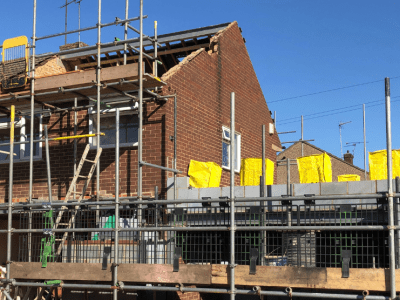The value of UK property is on the decline. As house prices fall at the fastest annual rate in 14 years, what does this mean from a tax perspective if you are looking to buy or sell a house? Our personal tax and private client experts share tax advice for buyers and sellers.

Last week Nationwide reported house prices had fallen by 3.8%, the largest annual decline since 2009. While there may be assumptions that this is good news for buyers and bad news for sellers, the variety of tax policies affecting the property market makes the situation less clear-cut.
If you are buying or selling a property, now or in the near future, it is important to understand how tax could impact the process.
Key tax considerations for property sellers
Are you looking to sell a property before the house prices drop any further? Capital Gains Tax (CGT) and, if relevant, Inheritance Tax (IHT) are two costs to consider during the sales process.
Your CGT liability – If the property you are selling is not your main residence, you may be liable to pay CGT on any profit you make on the sale. If you are liable, you will need to declare this to HMRC within 60 days of the date of sale. Contact us to speak to a CGT specialist to discuss opportunities to reduce your liability through tax planning.
The reduction in CGT Allowance – The CGT allowance was reduced by more than 50% in April 2023, decreasing from £12,300 to £6,000. This allowance is set to halve again in April 2024 to £3,000. Even with the fall in house prices, this lower tax threshold could result in larger CGT costs.
Potential IHT refund – If you are set to inherit money from the sale of a property, you should pay close attention to any changes in its value. The executor/s of the will may be able to claim an IHT refund (‘IHT loss relief’) on a property sold during the administration period if the IHT paid was based on the property’s value when the owner died and house prices have decreased significantly since then.
Key tax considerations for property buyers
If you are looking to take advantage of the falling house prices and purchase a new property, it is essential that you have a full picture of any associated costs and tax requirements. Lower house prices do not automatically make buying property more affordable.
Alternative ownership – If you are buying a property that will not be your main residence, you may wish to consider whether this should be bought personally or whether it could be more tax effective to acquire the property through an alternative ownership structure, such as a limited company or a trust.
Your tax returns and primary source of income – If your primary source of income is not PAYE income (e.g. you are a company director, sole trader or landlord), you may need to get your tax returns for the year ended 5th April 2023 submitted as soon as possible. Mortgage providers require buyers to provide them with up-to-date proof of income when buying a property.
Buying property for someone else – If you are in the fortunate position to be able to buy a property for a family member (such as one of your children) you may be able to access tax savings through Stamp Duty Land Tax and asset protection. The availability of these savings will depend on the ownership structure you choose.
Specialist tax advice could save you money
Whether you are planning to buy or sell property, we can help you save money by reducing your tax burden in the property market and beyond. Contact us today to discuss your personal needs with our expert tax team.




